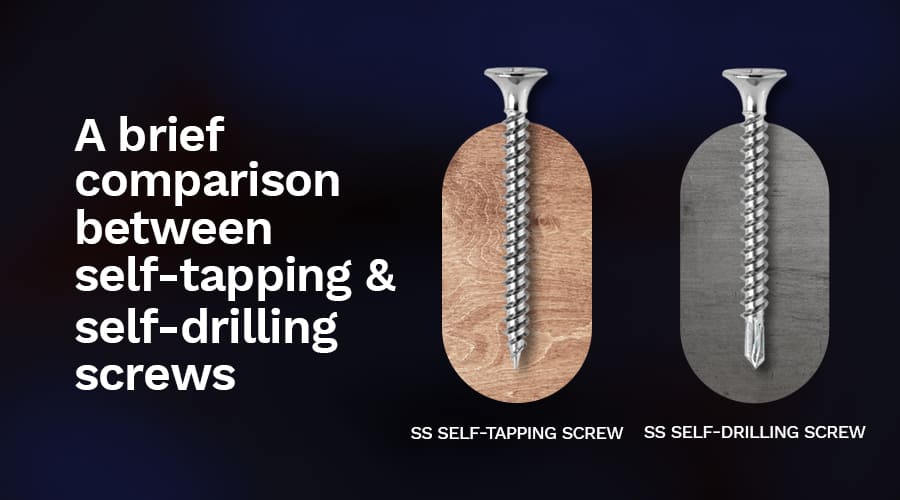


Screws are generally used to fasten or affix different objects or things together, they are used to form temporary or permanent joints depending upon the product in question. The entire screw portfolio is pretty large from Philips, and pan head, to machine & drywall screws each with a unique set of applications. A subcategory in this area is whether the it is self-tapping screw or a self-drilling screw. While both terms are used interchangeably in today’s times, they are poles apart in the manner of their installation. Let’s have a closer look at the key differences, similarities & usage of both types.
Self-tapping screws are normal screws that have a unique self-tapping ability whereby their threads & tip is enough for cutting through metals or objects. Their tips also range from pointed ones to flat & blunt ones depending on the type of threading. They are primarily used for drilling or screwing into stones and bricks or hard metal projects. They provide varying torque & power depending on the length of the screw being used.
Self-drilling screws, on the other hand, are popularly known as tek screws and have a drill bit-like structure at the tip that facilitates easier installation and joining. They are widely used for wood works, plyboards & light furniture. The drilling structure also serves as a cost-saving measure and ensures that the drilled hole is precisely the right fit, not an mm more or less.
Self-drilling screws eliminate the requirement of pre-drilling or pilot hole when joining objects. Their tip is sufficient enough to make the required hole of the right size that can make installation faster, easier & convenient. There is also a peace of mind factor since one doesn’t have to worry about the pilot hole being done at the wrong position or angle.
While self-tapping screws require separate pre-drilling or pilot hole before being driven into metal sheets or other objects. Their threading & tip is such that there is a need for a pilot hole. Careful consideration needs to be done when pre-drilling holes, as a slight variation, may lead to the development of cracks, and accumulation of dust & dirt that will hamper the life of the joint in question.
Self-tapping & self-drilling screws both serve the purpose of fastening objects that require strength, durability & smooth grip. Both have unique tips & threading structures that enable them to penetrate materials at a rapid rate. Joints that require robustness, reliability & resilience can be made by both screws. Both screws are capable of delivering on-point performance with greater accuracy. With the sole exception of pre-drilling or pilot hole & built structures, both screws are widely used in a variety of applications across sectors. With proper care when driving or installing screws, the wandering scenario can be prevented and the screw gets right into place without bursting or splitting.
SS Self-drilling screws are used for light-duty applications like work in fiberglass, plastics, plywood, softwood works and light metals. They find application primarily in industries where precision, fast installation & low cost are the key parameters. They are widely used in residential buildings and roofing’s, for affixing wood joining or metal-to-wood. The ability to eliminate the need of a pilot hole is pretty important in the construction and wooden industry.
SS Self-tapping screws on the upper hand, are ideal for heavy-duty applications, where hardened steel, metal-to-metal or hard plastics are to be used. Not just traditional sectors, self-tapping screw applications range from DIY work to surgery. The ability to be compatible with multiple thread & tip structures is unlike many others in the segment and gives them a leading edge in the industry.
Differences between self-tapping or self-drilling screws may be not much but they are significant in impact terms. Not to forget, each has its own unique set of abilities and applications. As such, it all depends on the type of work they are being used for.
When it comes to fasteners, quality is of utmost importance be it self-tapping or self-drilling screws. A little cost-cutting on quality for whatsoever reason could prove harmful in the long run, as the chances of structural damage increase and the joint may become disfigured or loose.
For the best quality and top-notch performance, give a try to LP Screw the ss screw manufacturer.